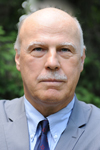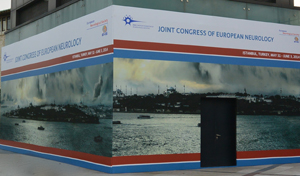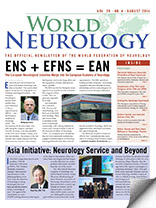
Wolfgang Grisold
By Wolfgang Grisold
Earlier this year, the first Joint Congress of European Neurology took place in Istanbul. This was the final stage in the process of merging the two European neurological societies — the European Neurological Society (ENS) and the European Federation of Neurological Societies (EFNS) — into the European Academy of Neurology (EAN). The first elections of the new society were held during the congress, naming G. Deuschl, Germany, as the first president of the EAN, and F. Fazekas, Austria, as its first vice president. The merger of the two societies was a logical step and now that it has occurred, it seems to be a natural development, but it took a huge effort and the engagement of many individuals to make it possible.
The ENS was the first European neurological society, founded in 1986. It held its first congress in Nice in 1989. That congress was organized by G. Said.
Said along with his co-founders, P. K. Thomas and Anita Harding, were the heart of the ENS at its founding. Their idea was to create a European society based on individual membership, with a strong emphasis on science and a structure similar to that of the American Academy of Neurology (AAN). As a consequence of this philosophy, the ENS traditionally has been less engaged in political aspects of neurology, fostering individual rather than national representation. The ENS, apart from holding excellent congresses, increasingly engaged in education through teaching, scholarships and internationalsupport for countries in need. Its major publication was the Journal of Neurology, which was supplemented by informative newsletter that appeared regularly.
The EFNS was founded in Vienna in 1991 by Prof. Gerstenbrand who had a vision of creating a large European society based on prior activities in Eastern Europe, such as the International Danube Symposia and the proposed Pan-European Society of Neurology. The philosophy of the EFNS was federal in constitution and structure, where individual European countries were the constitutional members. This construction was effective. Since its founding, the EFNS has contributed greatly to European neurology. The EFNS sponsored a number of activities, many of which were originally conceived within the EFNS, promoting education, CME accreditation and supporting neurology in the former Eastern European countries, by teaching courses, holding lectures and helping in the establishment of national neurological organizations. The primary publication of the EFNS is the European Journal of Neurology, which will become the official journal of the EAN. Neuropennews is an online publication serving the purpose of a newsletter.
 Due to differences in their philosophies, the two societies were effectively in competition, resulting in what many European neurologists concluded was an unnecessary duplication of effort. The initial event of their coming together was the creation of the European Board Examination in Neurology, where the examination’s creator, the UEMS – European Board of Neurology (UEMS/EBN) invited both societies to participate in its development. The presidents of the two organizations at that time — De Reuck of the EFNS and Moonen of the ENS — were both from Belgium. That facilitated the process of initiating a proposal for the creation of a joint EAN.
Due to differences in their philosophies, the two societies were effectively in competition, resulting in what many European neurologists concluded was an unnecessary duplication of effort. The initial event of their coming together was the creation of the European Board Examination in Neurology, where the examination’s creator, the UEMS – European Board of Neurology (UEMS/EBN) invited both societies to participate in its development. The presidents of the two organizations at that time — De Reuck of the EFNS and Moonen of the ENS — were both from Belgium. That facilitated the process of initiating a proposal for the creation of a joint EAN.
There were many additional steps necessary for the eventual merger. One major step was the agreement of the European delegates of the EFNS to this proposal in Florence 2009 and the subsequent agreement of ENS members. A joint task force was then formed that meticulously prepared the details for the merger and also created a new constitution and voting system.
The EAN combines the best of the developments of both societies. It is expected to foster neurology within Europe for the best of patient care, and to support and encourage science, teaching and education, as well as to be a transparent, open-minded and member-oriented society that provides an essential service for its members.
The WFN acknowledges this development toward a strong European society, and we hope to cooperate in further projects, especially where those involve furthering neurological education in countries in need of additional resources.
Grisold is from the Department of Neurology, Kaiser Franz Josef Hospital, Vienna, Austria.
